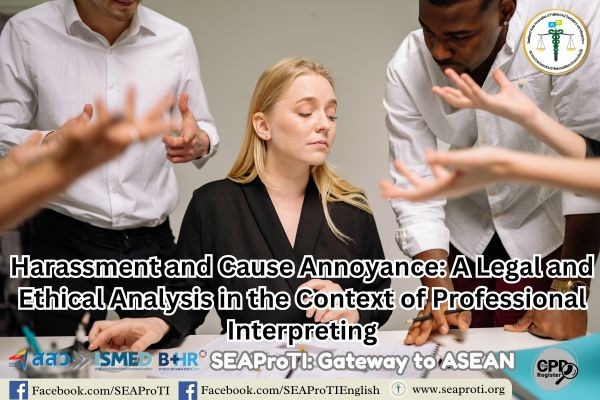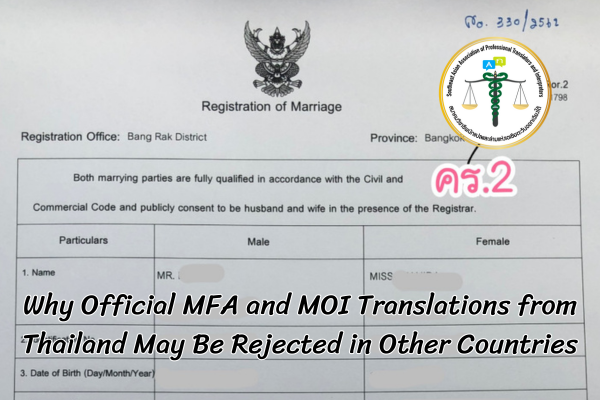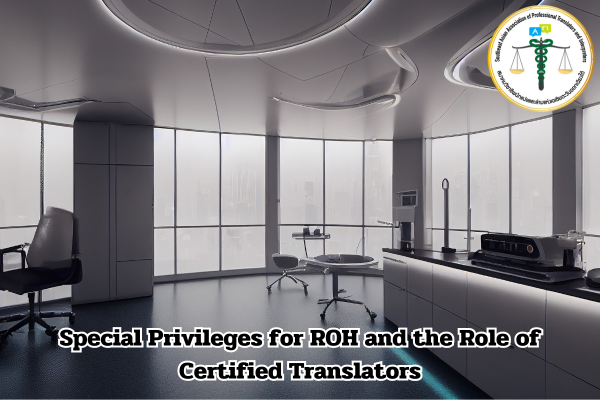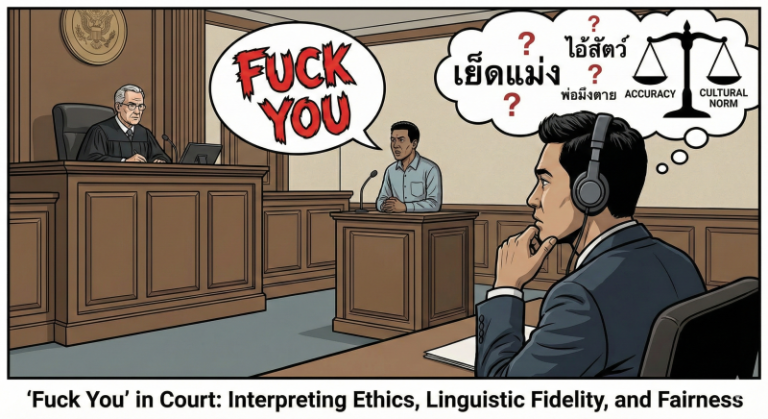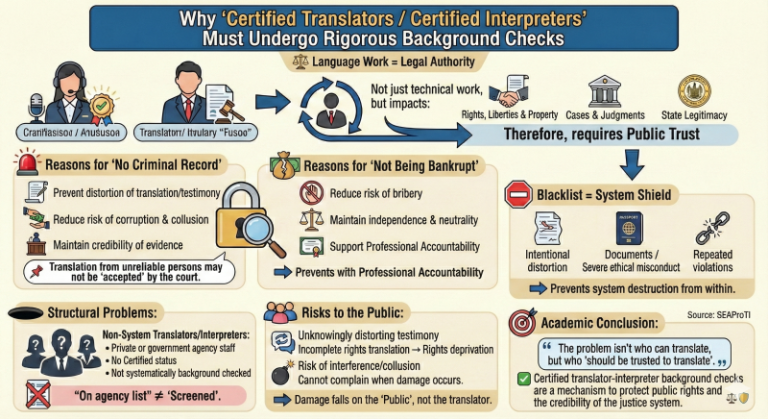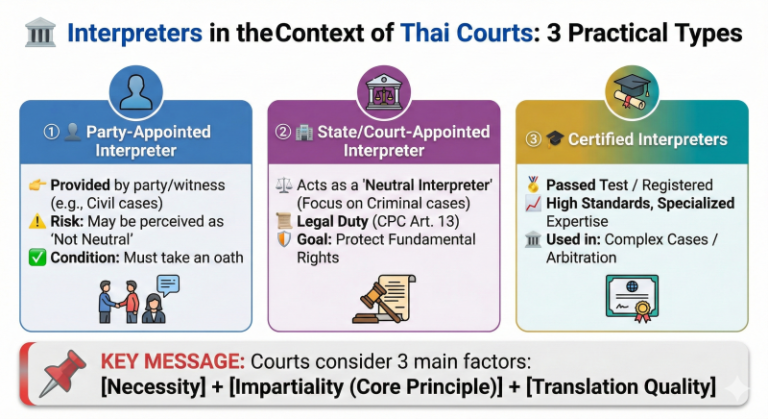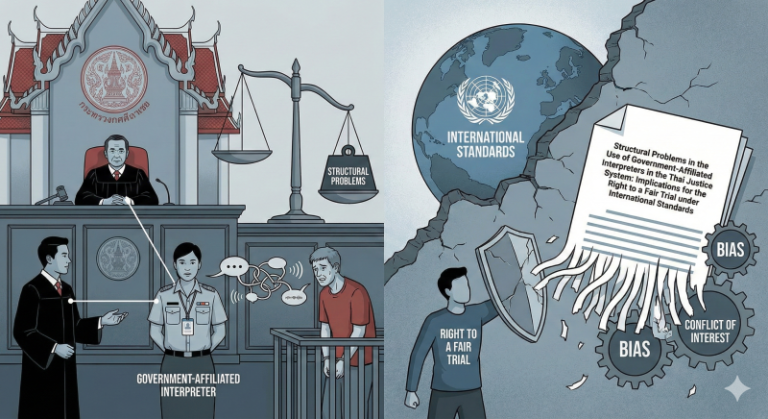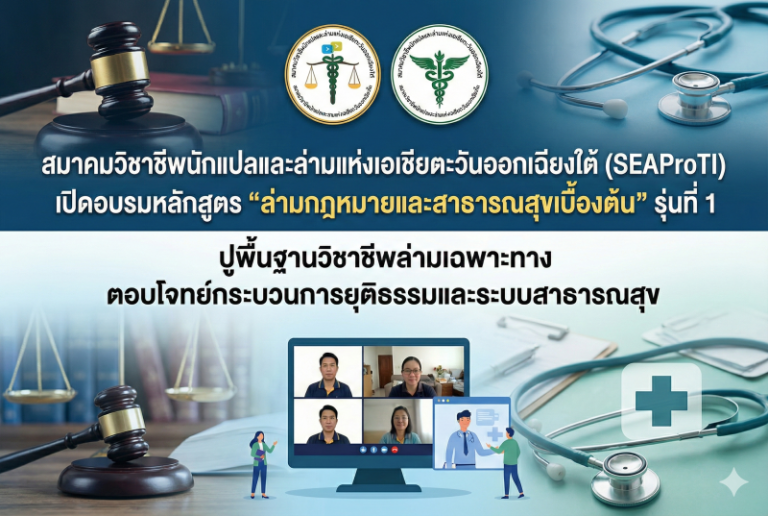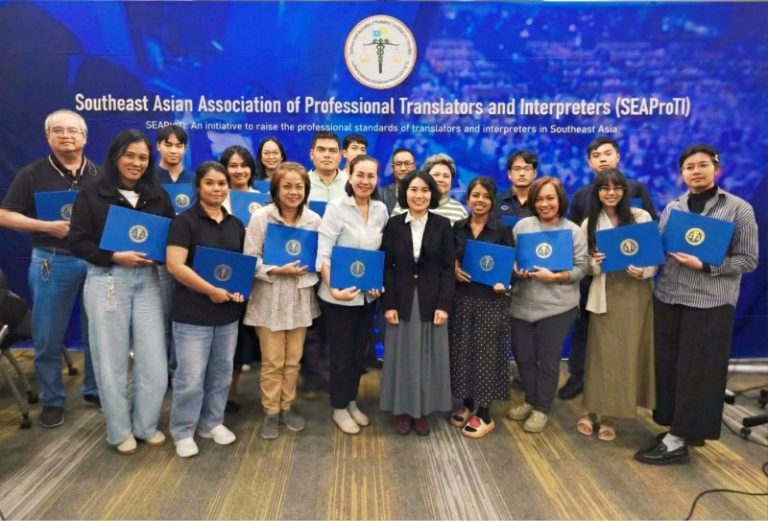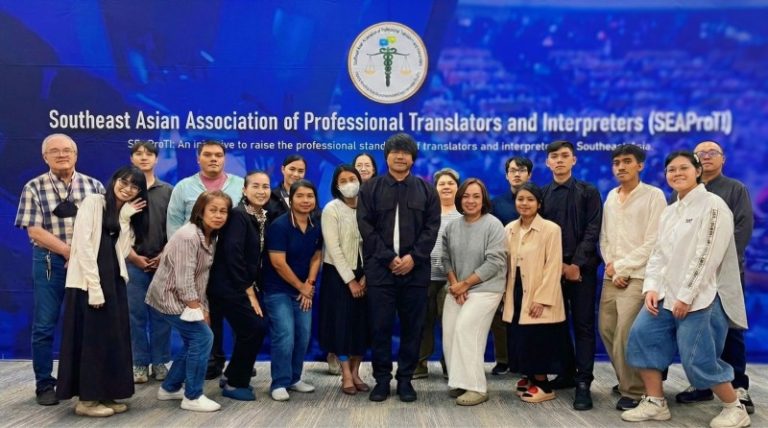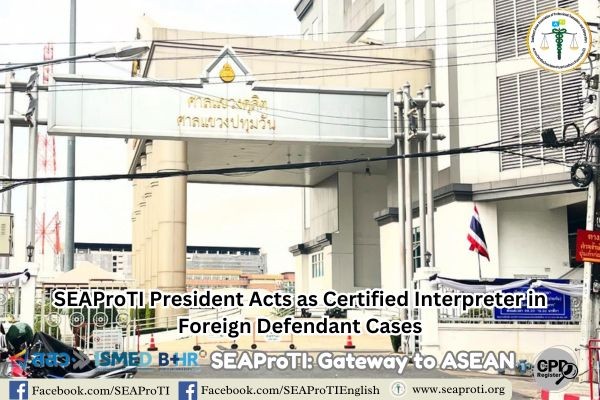Harassment and Cause Annoyance: A Legal and Ethical Analysis in the Context of Professional Interpreting
18 October 2025, Bangkok – This article examines the conceptual and legal distinctions between “harassment” and “cause annoyance,” with a specific focus on their relevance to the professional ethics of interpreters. Using a case example in which an interpreter persistently requests a slide presentation from individuals who have no authority or involvement in the preparation of such materials, the discussion highlights how inappropriate communication can breach professional boundaries and ethical norms. Although such conduct may not always constitute harassment, it may still amount to “causing annoyance,” reflecting a lack of professional restraint and understanding of ethical conduct.
Codes of ethics for interpreters play a vital role in defining professional boundaries, particularly in legal, diplomatic, and institutional contexts where neutrality, confidentiality, and respect are paramount (AIIC, 2022; SEAProTI, 2024). In practice, however, interpreters sometimes contact unrelated individuals in pursuit of materials or information, such as repeatedly requesting slide presentations from conference organizers or participants outside their chain of responsibility. Such behavior, though seemingly minor, raises important distinctions between “harassment” and “cause annoyance” — both of which have implications for professional discipline and workplace conduct.
Legal Definitions
Harassment
Harassment is defined as a repeated or deliberate act intended to make another person feel unsafe, humiliated, or psychologically pressured (ILO, 2019). Under Thai criminal law, such conduct may fall within Section 397 of the Thai Penal Code, which stipulates:
“Whoever commits any act of bullying, molesting, intimidating, or causing another person to feel ashamed or annoyed without justifiable reason shall be liable to imprisonment for not more than one month, or a fine not exceeding ten thousand baht, or both.” (Thai Penal Code, Section 397)
Key elements of harassment include intent and repetition, which together create a hostile environment and violate the dignity of the person concerned (European Commission, 2022).
Cause Annoyance
By contrast, “causing annoyance” refers to conduct that generates discomfort or unease without necessarily carrying malicious intent or constituting psychological harassment. Such behavior, though less severe, may still lack “justifiable reason” under Section 397 and typically stems from poor judgment, lack of restraint, or professional immaturity (Office of the Council of State, 2020).
Ethical Dimensions in Interpreting
Professional codes such as those of the International Association of Conference Interpreters (AIIC) and the Southeast Asian Association of Professional Translators and Interpreters (SEAProTI) outline clear expectations for interpreters to:
- Communicate only with individuals directly relevant to their assignment (Respect for professional boundaries);
- Avoid using professional status for personal benefit; and
- Maintain courtesy and propriety in all communications.
An interpreter who persistently requests a slide presentation from individuals outside their authority violates the ethical principle of professional boundaries. While this may not amount to harassment in the legal sense, it constitutes “cause annoyance” and breaches the standards of professional courtesy and restraint (SEAProTI, 2024).
Case Analysis
In the scenario where an interpreter repeatedly contacts unrelated individuals to obtain a presentation slide, the interpretation depends on both frequency and intent:
- If the contact merely causes discomfort or irritation → it qualifies as cause annoyance.
- If the contact continues after refusal, or includes coercive or pressuring language → it escalates to harassment.
From an ethical perspective, such behavior infringes upon the principle of respect and appropriateness within professional conduct. It could justify disciplinary action, including formal admonition or review by a professional ethics committee.
Conclusion
Although “harassment” and “cause annoyance” share similar statutory roots, they differ in intent, severity, and psychological impact. Within the interpreting profession, “cause annoyance” still constitutes an ethical breach, even if it does not meet the legal threshold for harassment. Interpreters are duty-bound to uphold neutrality, respect, and decorum in every aspect of their work. Promoting awareness of boundary ethics and professional courtesy is therefore essential for sustaining trust, dignity, and professionalism across interpreting environments.
References
- AIIC. (2022). AIIC Code of Professional Ethics. International Association of Conference Interpreters. https://aiic.org
- European Commission. (2022). EU Directive on Equal Treatment and Harassment Prevention. Brussels: European Union Publications Office.
- International Labour Organization (ILO). (2019). Convention No. 190: Violence and Harassment in the World of Work. Geneva: ILO.
- Office of the Council of State. (2020). Criminal Code Section 397: Commentary and Legal Interpretations. Bangkok: The Secretariat of the Cabinet.
- SEAProTI. (2024). Code of Professional Conduct and Ethics for Translators and Interpreters. Bangkok: Southeast Asian Association of Professional Translators and Interpreters.
- Thai Penal Code B.E. 2499 (as amended up to 2021), Section 397.
About Certified Translators, Translation Certifiers, and Certified Interpreters of SEAProTI
The Southeast Asian Association of Professional Translators and Interpreters (SEAProTI) has formally announced the qualifications and requirements for registration of Certified Translators, Translation Certification Providers, and Certified Interpreters in Sections 9 and 10 of the Royal Gazette, published by the Secretariat of the Cabinet, Office of the Prime Minister of Thailand, on 25 July 2024 (Vol. 141, Part 66 Ng, p. 100). Certified Translators, Translation Certification Providers, and Certified Interpreters
The Council of State has proposed the enactment of a Royal Decree, granting registered translators and recognized translation certifiers from professional associations or accredited language institutions the authority to provide legally valid translation certification (Letter to SEAProTI dated April 28, 2025)
SEAProTI is the first professional association in Thailand and Southeast Asia to implement a comprehensive certification system for translators, certifiers, and interpreters.
Head Office: Baan Ratchakru Building, No. 33, Room 402, Soi Phahonyothin 5, Phahonyothin Road, Phaya Thai District, Bangkok 10400, Thailand
Email: hello@seaproti.com | Tel.: (+66) 2-114-3128 (Office hours: Mon–Fri, 09:00–17:00)
Harassment กับ Cause Annoyance: การวิเคราะห์ในแง่กฎหมายและจรรยาบรรณวิชาชีพล่าม
18 ตุลาคม 2568, กรุงเทพมหานคร – บทความนี้วิเคราะห์ความแตกต่างระหว่างแนวคิด “Harassment” (การคุกคาม) และ “Cause Annoyance” (การก่อความรำคาญ) ทั้งในเชิงกฎหมายและจรรยาบรรณวิชาชีพล่าม โดยยกกรณีศึกษาที่ล่ามติดต่อหรือตามจิกขอ Slide Presentation จากบุคคลที่ไม่เกี่ยวข้องกับงาน ซึ่งสะท้อนให้เห็นการละเมิดขอบเขตหน้าที่และพฤติกรรมที่อาจเข้าข่ายการรบกวนในเชิงวิชาชีพ บทความชี้ให้เห็นว่าพฤติกรรมดังกล่าวแม้จะไม่ถึงขั้น “การคุกคาม” แต่เป็น “การก่อความรำคาญ” ที่ขัดต่อหลักจรรยาบรรณเรื่องความเหมาะสมและการเคารพผู้อื่น
จรรยาบรรณวิชาชีพล่าม (Code of Ethics for Interpreters) มีบทบาทสำคัญในการกำหนดมาตรฐานความประพฤติของผู้ประกอบวิชาชีพ โดยเฉพาะในสภาพแวดล้อมทางกฎหมายและการทูตที่ต้องรักษาความเป็นกลาง ความลับ และความเคารพต่อผู้มีส่วนเกี่ยวข้องทุกฝ่าย (AIIC, 2022; SEAProTI, 2024) อย่างไรก็ตาม ในทางปฏิบัติมักพบพฤติกรรมที่ล่ามบางรายติดต่อบุคคลภายนอกเกินขอบเขตหน้าที่ เช่น การตามจิกขอเอกสารหรือสไลด์จากผู้จัดงานที่ไม่ได้รับมอบหมายโดยตรง ซึ่งแม้จะดูเป็นเรื่องเล็กน้อย แต่สะท้อนถึงความไม่เข้าใจระหว่าง “การคุกคาม” กับ “การก่อความรำคาญ” ที่มีผลทางจิตใจและทางจรรยาบรรณแตกต่างกัน
ความหมายทางกฎหมาย
Harassment (การคุกคาม)
“Harassment” หมายถึง พฤติกรรมซ้ำ ๆ ที่มุ่งทำให้ผู้ถูกกระทำรู้สึกไม่ปลอดภัย อับอาย หรือถูกกดดันทางจิตใจ (ILO, 2019) ในกฎหมายไทย พฤติกรรมลักษณะนี้อาจเข้าข่ายมาตรา 397 แห่งประมวลกฎหมายอาญา ซึ่งบัญญัติว่า
“ผู้ใดกระทำด้วยประการใด ๆ อันเป็นการรังแก ข่มเหง คุกคาม หรือกระทำให้ผู้อื่นได้รับความอับอายหรือเดือดร้อนรำคาญ โดยไม่มีเหตุอันสมควร ต้องระวางโทษจำคุกไม่เกินหนึ่งเดือน หรือปรับไม่เกินหนึ่งหมื่นบาท หรือทั้งจำทั้งปรับ” (ประมวลกฎหมายอาญา, มาตรา 397)
องค์ประกอบสำคัญของการคุกคามคือ เจตนา (intent) และ ความถี่หรือความต่อเนื่องของพฤติกรรม ซึ่งทำให้ผู้ถูกกระทำรู้สึกถึงการละเมิดศักดิ์ศรีความเป็นมนุษย์ (dignity) และสภาพแวดล้อมที่ไม่เป็นมิตร (hostile environment) (European Commission, 2022)
Cause Annoyance (การก่อความรำคาญ)
ในขณะที่ “Cause Annoyance” หมายถึง การกระทำที่สร้างความรำคาญหรือความไม่สบายใจ โดยไม่มีเจตนาร้ายแรงหรือคุกคามโดยตรง พฤติกรรมเช่นนี้อาจไม่ถึงขั้นผิดอาญาแต่ยังถือว่า “ไม่มีเหตุอันสมควร” ภายใต้หลักเดียวกันของมาตรา 397 ซึ่งมักเกิดจากความไม่รู้หรือขาดการยับยั้งชั่งใจ (Office of the Council of State, 2020)
มิติของจรรยาบรรณวิชาชีพล่าม
ในจรรยาบรรณของสมาคมล่ามสากล เช่น AIIC (International Association of Conference Interpreters) และ SEAProTI (Southeast Asian Association of Professional Translators and Interpreters) มีข้อกำหนดชัดเจนให้ล่าม
- ติดต่อเฉพาะบุคคลที่เกี่ยวข้องโดยตรงกับภารกิจ (Respect professional boundaries)
- ไม่ใช้ตำแหน่งหรืองานเพื่อผลประโยชน์ส่วนตัว
- รักษาความสุภาพและมารยาทในการสื่อสารทุกช่องทาง
กรณีล่ามตามจิกขอ Slide Presentation จากบุคคลที่ไม่มีส่วนเกี่ยวข้องกับการจัดทำหรือไม่อยู่ในอำนาจของตน จึงถือเป็นการละเมิดขอบเขตทางวิชาชีพและจรรยาบรรณ แม้ยังไม่รุนแรงถึงขั้น “harassment” แต่เป็น “การก่อความรำคาญ” ที่สะท้อนการขาดวุฒิภาวะทางวิชาชีพ (SEAProTI, 2024)
การวิเคราะห์กรณีศึกษา
กรณีล่ามติดต่อซ้ำหลายครั้งเพื่อขอ Slide Presentation จากบุคคลภายนอกโดยไม่มีอำนาจหน้าที่นั้น อาจวิเคราะห์ได้ว่า
- หากผู้ถูกติดต่อรู้สึกเพียงไม่สบายใจ → ถือเป็น การก่อความรำคาญ (Cause Annoyance)
- หากมีการติดต่อซ้ำหลังจากถูกปฏิเสธ หรือใช้ถ้อยคำกดดันหรือข่มขู่ → ยกระดับเป็น การคุกคาม (Harassment)
ในเชิงจรรยาบรรณ การกระทำดังกล่าวเป็นการละเมิด “หลักความเหมาะสมและความเคารพผู้อื่น” ซึ่งอาจนำไปสู่การตักเตือนหรือพิจารณาทางวินัยโดยคณะกรรมการจรรยาบรรณของสมาคม
สรุป
“Harassment” และ “Cause Annoyance” แม้มีรากทางกฎหมายร่วมกัน แต่แตกต่างกันในระดับของ เจตนาและผลกระทบทางจิตใจ สำหรับวิชาชีพล่าม การก่อความรำคาญถือเป็นการละเมิดจรรยาบรรณ แม้ยังไม่ถึงขั้นคุกคามก็ตาม เพราะล่ามมีหน้าที่ต้องรักษาความเป็นกลาง ความสุภาพ และขอบเขตวิชาชีพอย่างเคร่งครัด การเสริมสร้างความเข้าใจเรื่อง “Boundary Ethics” และ “Professional Courtesy” จึงเป็นส่วนสำคัญของการพัฒนาวิชาชีพและการคุ้มครองศักดิ์ศรีของผู้ปฏิบัติงานทุกฝ่าย
🔖 เอกสารอ้างอิง (References)
- AIIC. (2022). AIIC Code of Professional Ethics. International Association of Conference Interpreters. https://aiic.org
- European Commission. (2022). EU Directive on Equal Treatment and Harassment Prevention. Brussels: European Union Publications Office.
- International Labour Organization (ILO). (2019). Convention No. 190: Violence and Harassment in the World of Work. Geneva: ILO.
- Office of the Council of State. (2020). Criminal Code Section 397: Commentary and Legal Interpretations. Bangkok: The Secretariat of the Cabinet.
- SEAProTI. (2024). Code of Professional Conduct and Ethics for Translators and Interpreters. Bangkok: Southeast Asian Association of Professional Translators and Interpreters.
- ประมวลกฎหมายอาญา พ.ศ. 2499 (แก้ไขเพิ่มเติมถึงฉบับที่ 28 พ.ศ. 2564). มาตรา 397.
เกี่ยวกับนักแปลรับรอง ผู้รับรองการแปล และล่ามรับรองของสมาคมวิชาชีพนักแปลและล่ามแห่งเอเชียตะวันออกเฉียงใต้
สมาคมวิชาชีพนักแปลและล่ามแห่งเอเชียตะวันออกเฉียงใต้ (SEAProTI) ได้ประกาศหลักเกณฑ์และคุณสมบัติผู้ที่ขึ้นทะเบียนเป็น “นักแปลรับรอง (Certified Translators) และผู้รับรองการแปล (Translation Certification Providers) และล่ามรับรอง (Certified Interpreters)” ของสมาคม หมวดที่ 9 และหมวดที่ 10 ในราชกิจจานุเบกษา ของสำนักเลขาธิการคณะรัฐมนตรี ในสำนักนายกรัฐมนตรี แห่งราชอาณาจักรไทย ลงวันที่ 25 ก.ค. 2567 เล่มที่ 141 ตอนที่ 66 ง หน้า 100 อ่านฉบับเต็มได้ที่: นักแปลรับรอง ผู้รับรองการแปล และล่ามรับรอง
สำนักคณะกรรมการกฤษฎีกาเสนอให้ตราเป็นพระราชกฤษฎีกา โดยกำหนดให้นักแปลที่ขึ้นทะเบียน รวมถึงผู้รับรองการแปลจากสมาคมวิชาชีพหรือสถาบันสอนภาษาที่มีการอบรมและขึ้นทะเบียน สามารถรับรองคำแปลได้ (จดหมายถึงสมาคม SEAProTI ลงวันที่ 28 เม.ย. 2568)
สมาคมวิชาชีพนักแปลและล่ามแห่งเอเชียตะวันออกเฉียงใต้ เป็นสมาคมวิชาชีพแห่งแรกในประเทศไทยและภูมิภาคเอเชียตะวันออกเฉียงใต้ที่มีระบบรับรองนักแปลรับรอง ผู้รับรองการแปล และล่ามรับรอง
สำนักงานใหญ่: อาคารบ้านราชครู เลขที่ 33 ห้อง 402 ซอยพหลโยธิน 5 ถนนพหลโยธิน แขวงพญาไท เขตพญาไท กรุงเทพมหานคร 10400 ประเทศไทย
อีเมล: hello@seaproti.com โทรศัพท์: (+66) 2-114-3128 (เวลาทำการ: วันจันทร์–วันศุกร์ เวลา 09.00–17.00 น.)


